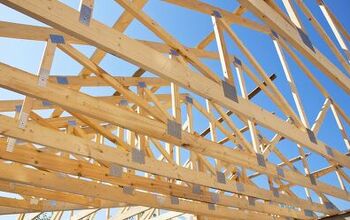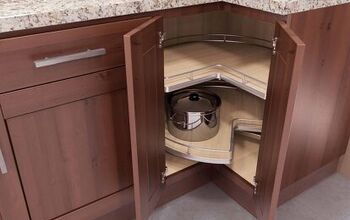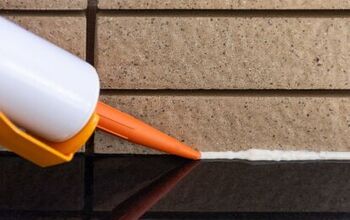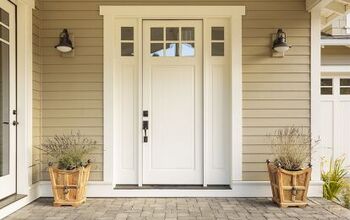Organic Versus Regular Mulch

Planning a garden and decorating your landscape come along with many responsibilities and nuances. Even simply choosing the best type of mulch for your yard can be tricky, especially if you don’t know how they differ. So, what is the difference between organic mulch and regular mulch?
The biggest difference between organic mulch and inorganic, or regular mulch, is that organic mulch is made of natural materials. As organic mulch breaks down, it will infuse your soil with potassium, phosphorus, and nitrogen. Inorganic mulch doesn’t have those benefits, but it can promote healthy drainage and deter pests in your yard.
We have assembled a comprehensive guide containing everything you must know about organic and inorganic mulch. Follow along as we explore the pros, cons, and major differences between organic and inorganic mulch.
Organic Versus Inorganic Mulch
Organic and regular mulch, or inorganic mulch, vary in many ways. First, organic mulch is made of natural materials, like bark, shredded leaves, wood, compost, grass clippings, and more. Conversely, inorganic, regular mulch is made of a variety of substances, from stones and gravel to rubber and plastic sheets.
It is a major difference that affects the performance, cost, and longevity of the mulch. Below, we assembled a comprehensive list of how organic and regular mulch differ, while highlighting their pros and cons.
Organic Mulch Pros
Infuses Soil With Nutrients
Plants need nutrients, which they typically pull from the soil. Instead of treating your soil with store-bought nutrients, you can cover it with organic mulch. The organic mulch slowly breaks down naturally and infuses the soil with nutrients over time.
That includes potassium, phosphorus, and nitrogen, which your plants need to thrive but may struggle to obtain otherwise. Nutrients encourage healthy growth and, more importantly, longevity.
Regulates Soil Temperature
Soil temperature plays a significantly larger role in plant health, growth, and development than many people may think. It affects everything from nutrient absorption and root growth to pest and disease vulnerability. Mulch can help keep your soil at a healthy, consistent temperature, and that’s one of the biggest benefits.
You can easily compare organic mulch to the insulation in your house. During the summer, it lowers the soil temperature and can warm the soil during the fall and winter, which is enough to protect your plants during cold snaps.
Moisture Retention
Moisture retention is one of the most common reasons people use organic mulch, and for good reason. Organic mulch can retain water, which is essential in climates with hot, often dry summers. It affects how quickly water drains through the mulch and into the soil.
That alone can prevent several problems, such as soil erosion, which is a nightmare to deal with. The reduced water runoff ensures you won’t lose topsoil, and the water will go where it needs to. Otherwise, you may experience problems with compacted soil and even root damage.
Organic Mulch Cons
Nothing is perfect, and that includes organic mulch. As beneficial as organic mulch is, it also comes with some downsides that turn people off, such as:
You Must Regularly Replace It
You must regularly replace mulch, whether it’s organic or inorganic. However, homeowners must typically replace organic mulch sooner than inorganic, regular mulch. That’s because the benefits wear off sooner, as the nutrients and beneficial compounds eventually wear off.
The mulch may still carry some benefits, like temperature regulation, but it won’t be as effective or affect soil chemistry. Many homeowners replace or top off their organic mulch yearly, which is inconvenient for some people. Some view that as a big commitment, especially when managing a garden for many years.
It Can Attract Pests
The decomposing matter in organic mulch has many amazing benefits that any gardener can appreciate. However, it can also attract many pests to your mulch and soil, which may eventually infest your plants. Decomposed organic matter attracts pests because it provides a food source, so pests are more likely to linger.
Pests like termites, beetles, earwigs, ants, and even cockroaches often flock to organic mulch. It’s the same reason why many composters find a bunch of bugs in their compost bins. Luckily, you can combat this problem if you plant pest-repelling plants, such as marigolds and lemon thyme.
Contamination Is Possible
Organic mulch typically includes a wide variety of organic materials, such as wood and hay, that come from outside. Once collected, these materials are mixed and turned into the organic mulch you find at plant nurseries and garden centers. Unfortunately, the mixture sometimes contains seeds from plants most people want to avoid, such as weeds.
The next thing you know, you may have weeds pop up shortly after laying fresh organic mulch. That’s because the materials that go into organic mulch come from nature. It’s hard to check it all for weed seeds and other contaminants, so some slip through the cracks.
Some of the ingredients may also be contaminated with pests and diseases. Of course, that’s not always the case, but it’s important to buy organic mulch from trustworthy sources.
Inorganic Mulch Pros
Regular mulch, or inorganic mulch, is just as widely used as organic mulch. Don’t let the fact that it’s not organic fool you; inorganic mulch boasts many benefits, such as:
Many Choices
Because regular mulch is inorganic, it comes in a wide variety of styles, materials, and colors. This opens the door to many opportunities and gives you some creative freedom. For example, you can look for colorful rubber mulch that matches the color of your home’s exterior.
You can also choose materials that match your yard and aesthetic, such as stones, gravel, and rubber. Some manufacturers even sell rubber mulch that looks like it’s made of wood. Inorganic mulch is a great option for people who don’t like the look of organic mulch.
Less Vulnerable To Pests
Pests are mostly drawn to food and water sources, which inorganic mulch doesn’t provide. Because of that, you’re less likely to find pests in your inorganic mulch. This can make yard maintenance easier, and that alone makes inorganic mulch quite appealing to many people.
Longevity
As we mentioned, organic mulch doesn’t last forever because it contains organic materials that break down. That’s less of an issue with inorganic, regular mulch, which contains materials that take a long time to decompose. Inorganic mulch can last at least 5 to 10 years before you must replace it.
This can help homeowners save time and money, as they won’t have to replace their mulch annually. Gravel and stone mulch can last decades in many cases, but it may not look great after 10 years. Inorganic mulch is commonly used at commercial buildings, but homeowners use it too.
Inorganic Mulch Cons
Inorganic mulch may be convenient and durable, but it’s not without its problems, such as:
High Upfront Cost
Inorganic mulch has a higher upfront cost than organic mulch, which deters some people. For example, organic mulch typically costs between $30 and $150 per cubic yard, whereas regular mulch costs $40 and $400 per cubic yard. This can be quite expensive if you have a big yard with lots of ground to cover.
However, you must weigh the pros and the cons, especially when it comes to longevity. While inorganic mulch costs more, you won’t have to replace it nearly as often as organic mulch.
Fewer Benefits for Your Plants
Unfortunately, inorganic mulch doesn’t offer many benefits for plants. Gravel and stone have great drainage, but they don’t infuse your plants with any nutrients. Inorganic mulch can even hurt your plants in some cases, such as overheating.
That’s because some types of inorganic mulch, like stones, can retain heat too well and overheat your plants. This can harm your plants and even damage the roots during the spring and summer.
Some Types Can Restrict Water
Landscape fabric and plastic sheeting are two types of inorganic mulch that are somewhat controversial. The biggest problem with them is that in some cases, they don’t allow water to seep through. This can damage the roots and dehydrate the soil beneath it.
Some inorganic mulch can restrict air as well, especially if it’s laid out as a sheet or packed tightly. This is much less of a problem with stone, gravel, and rubber mulch. The key is to pack it loosely enough to ensure proper airflow.
Summing It Up
Organic mulch offers more benefits than inorganic mulch, such as infusing the soil with nutrients. Inorganic mulch has a higher upfront cost than organic mulch, but inorganic mulch lasts much longer. However, organic mulch is a better option if you want to encourage healthy plant growth and keep everything natural.
Related Guides:

Nick Durante is a professional writer with a primary focus on home improvement. When he is not writing about home improvement or taking on projects around the house, he likes to read and create art. He is always looking towards the newest trends in home improvement.
More by Nick Durante












![The 5 Best Angle Grinders – [2022 Reviews & Buyer's Guide]](https://cdn-fastly.upgradedhome.com/media/2023/07/31/9071326/the-5-best-angle-grinders-2022-reviews-buyer-s-guide.jpg?size=350x220)














